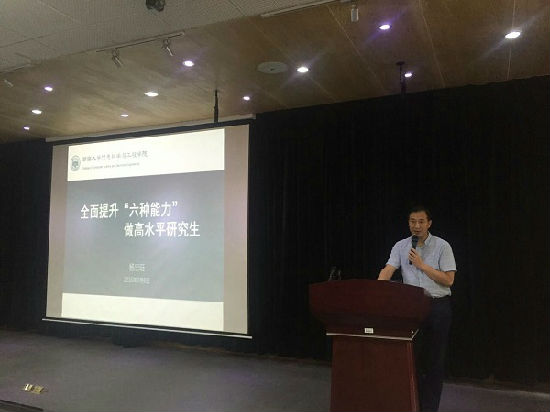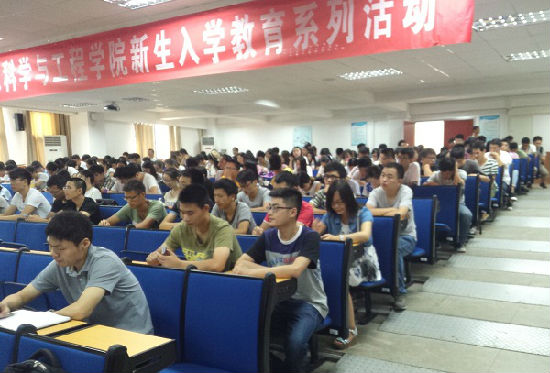2016 CSEE GRADUATE STUDENTS ENTRANCE EDUCATIONAL THEME REPORT BY YANG
/信科院:2016级研究生入学教育主题报告
Date of Publication: 09.08.16./ 发布于:2016-09-08
Translator & Editor: Rosie YU Rizhen/ 编译:余日臻


Focusing on personal growth for graduate students while pursuing their work goal in the College of Computer Science and Electronic Engineering, our college party secretary Mr. YANG Zhongwang has developed a new educational model based on six abilities: learning, decision-making, integrity, innovation, leadership, and adaptability.
Improving the ability to identify uncommon characteristics of individuals, teams or other subjects from a mass of needs, the solution can be used to extrapolate common factors behind the success of HNU educational quality. Factors are "double world-class" (world-class university, world-class major), the academic ethics, the overall quality of a student or even party member's pioneering spirit.
“Looking at the award-wining alumni, for example, we could detect the good players from the bad ones by five characteristics. We’ve even applied it to the undergraduate students' educational model,” says Yang, adding that one of the key challenges has been modeling the immense amount of successful candidates available. These five characteristics are to learn, to practice, to create, to persist and to endure.
But his solution isn’t just about charting the tenets of success. It can be applied to all kinds of life to find and isolate unusual features. “This utilizing prehistorical powers metaphor (“洪荒之力”的比喻) hasn’t been used before RIO 2016 but we’ve proven it can be applied to any kind of competitions,” he says.
Putting that approach to the real-world test has been part of Yang’s tenure-ship as a party secretary at the College of Computer Science and Electronic Engineering HNU. “We’re looking into the area of student compliance. The main challenge is trying to find the best planning for this term– when new duties and responsibilities are needed, it’s up to our graduate students to carry them out.”
But despite the early successes in the guidance of students' career, Chenzhou-born Yang had different ideas about his future when his was growing up. “I was very keen on educational model studies and I really wanted to do lots of work at university. But my previous colleagues suggested me to have more leisure time.” Since working at CSEE, he’s never looked back.
“It seemed like this school would be a great fit for me,” he says, adding he’s enjoyed courses in everything from algorithm design to machine learning and the school’s motto “Seeking Truth from Facts; Daring to be Pioneers” at HNU.
And while graduate students imagines ultimately furthering their research career in HNU CSEE, where they believe there are many additional opportunities available in their field, Yang says he’s glad he accepted his offer to work for CSEE all those years ago.
“Computer science and electronic engineering can seem intimidating when you’re a young student looking at your options. It’s easy to feel you’re not good enough and many students certainly felt like that when they just enter their graduate study path. But it’s really not as difficult as it seems to enter this field. And when you start addressing problems and finding your own solutions, it’s a great feeling.”












